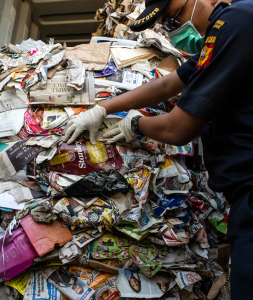Customs fostering Sustainability for People, Prosperity and the Planet: A few words about the theme of the year
25 February 2020
By Kunio Mikuriya, Secretary General, WCOEach year, the WCO Secretariat chooses a theme that is relevant to the international Customs community and its partners. The slogan chosen for 2020 is “Customs fostering Sustainability for People, Prosperity and the Planet.” An apt theme as 2019 was the year where issues such as sustainability and climate concerns dominated public debate, with Oxford Dictionaries declaring “climate emergency” the word of the year for 2019.
The United Nations 2030 Agenda for Sustainable Development recognizes international trade as an engine for inclusive economic growth and poverty reduction, and an important means to achieve the 17 Sustainable Development Goals (SDGs). Being the main enforcer of cross-border trade-related regulations, Customs can ensure that international trade contributes to accelerating progress in achieving these goals.
For example, fair revenue collection and the fight against commercial fraud and illicit financial flows support poverty reduction and health and social programmes by ensuring that national governments are not deprived of critical revenues necessary to fund public infrastructure and services. It also contributes to reducing unfair competition and to creating transparent and predictable conditions for trade, whilst facilitating legitimate business that will in turn contribute to economic growth and job opportunities.
Efficient enforcement of environmental regulations protects people, the planet and all its inhabitants, and is a key contributor to prosperity. Indeed, environmental crime is a threat to sustainable development. Poaching, wildlife trafficking and the illicit logging, fishing, mining and waste trades threaten international security as well as economic growth and development.
Implementation of efficient procedures and processes at borders can stimulate growth and prosperity, and lessen the impact of trade operations on the environment. Even though the way goods are produced often has a greater bearing on carbon emissions than their transport, the movement of goods has environmental consequences whose scale largely depends on the performance of all supply chain stakeholders.
By developing guidance and international standards that drive efficiency and by sharing our expertise on how rules agreed internationally can be effectively applied, the WCO can ensure that trade fulfills its pro-growth and pro-development ambition in a sustainable way.
Under this year’s banner, WCO Members are, therefore, encouraged to put sustainability at the centre of their future improvements in practices and processes, not only at the operational level, but also at the internal level, as Customs, like any organization, uses natural resources and produces waste.
When it comes to minimizing our direct and indirect impact on the environment, administrations can apply simple practices such as ensuring that offices and facilities are using energy-efficient equipment, which is switched-off when not in use, banning single-use plastic items, separating biodegradable and non-degradable waste, and making water fountains available instead of disposable plastic water bottles. Some administrations have even switched to renewable energy in their various office buildings, and some have even installed solar photovoltaic (PV) systems on their roofs.
At the WCO Secretariat, we decided to eliminate disposable plastic bottles, which were supplied to delegates attending meetings and events. Instead, staff and delegates must use refillable bottles, which they can fill with filtered water provided by water stations installed next to the main meeting rooms. Plastic cups and utensils have also been eliminated, ultimately reducing the organization’s plastic footprint.
Customs administrations must also try to ensure that we apply environmental-friendly methods when disposing of seized goods, especially those containing toxic elements. Depending on the nature of the goods involved, this can be a costly and technically complex undertaking, requiring access to specialized facilities and expertise. We, therefore, invite those administrations wishing to review their environmental footprint to start a conversation with various stakeholders, such as the ministry responsible for the environment, and private companies active in this sector.

Besides adopting the right attitudes and practices, Customs has a critical role to play in ensuring the effective and efficient implementation of various environmental treaties, protocols, other agreements, and Multilateral Environmental Agreements (MEAs). Their objectives include addressing the illicit trade in hazardous waste and ozone-depleting substances, combating the illicit trade in endangered species, and preventing the spread of plant and animal diseases, as well as invasive alien species.
Customs can also contribute to building sustainable societies by facilitating legal logistics flows. International trade is both a contributor to global warming, and an intrinsic component in the many solutions that exist. Consequently, international trade and border management are being incorporated into the global warming policy framework. Customs’ role here is to streamline procedures and use modern practices and tools to control trade transactions so that they can reduce the time and cost of moving goods across borders, including the environmental costs.
To take our annual theme forward, for the dossier of this edition of the magazine, we invited various people to share information on initiatives and related projects that contribute to fostering sustainability for people, prosperity and the planet. The idea is, as always, to highlight any challenges faced, to showcase those projects that will inspire others, and, of course, to communicate best practices.
Let me now turn to the actual content of the dossier. It starts with two articles by the WCO Secretariat reminding administrations of the importance of implementing the various environmental agreements and Customs’ role and responsibilities in this regard. Raising awareness on the MEAs is indeed necessary. As shown by the article presenting the results of a survey that the Secretariat conducted among Customs administrations, some of them still need to build knowledge and skills to implement the MEAs, and the Secretariat will look at this issue with its Green Customs partners.
This is followed by an article which looks at the role of the HS in supporting environmental control measures on goods of concern at the border as well as in implementing import and export incentives for goods that offer environmentally better alternatives. By bringing both types of goods into greater visibility in trade flows, goods nomenclatures enable import and export licensing systems to be enforced, the consumption and production of controlled substances to be calculated, and tax and facilitation benefits to be applied to environment-friendly products. I would like to highlight that the 2020 edition of the HS, that will come into force on 1 January 2022, goes much further than previous editions in regard to the environment and is the “greenest” HS to date.
Two articles then look at two specific MEAs, respectively the Basel Convention, which regulates trade flows in hazardous and other wastes, and the Montreal Protocol, which aims at protecting the ozone layer and preventing any further global warming of the planet.
To mitigate climate change, some governments have decided to shift energy sources from coal and petroleum to renewable energies: solar, wind, geothermal, and hydropower. In a short article, Uruguay Customs explains how it supported the country’s energy revolution by facilitating the import of machines, material or large-volume parts, which are used to produce green energy.
Another way to reduce emissions of carbon dioxide and other greenhouse gases is to protect plants in the ocean and plants on land, and especially forests. Enforcing timber trade regulations is crucial to protect natural forests and the people dependent on them, and to ensure that the trade is sustainable and does not threaten the survival of species in the wild. In an article on the illegal timber trade, the Environmental Investigation Agency looks at various existing legal frameworks and explains its role and how its actions can support enforcement.
Despite the mode of production often prevailing over transport in terms of carbon emissions, it is crucial to minimize the environmental impact of transporting goods. This depends, to a large extent, on the performance of logistics systems. In particular, environmental performance over the last few miles before goods reach consumers is critical. In the last article of this dossier, MJC2, a company providing scheduling systems and optimization software, explains how logistics flows can be improved by using a combination of artificial intelligence systems and digitalization, and how Customs could benefit from technology to enhance its monitoring of international trade.
In wrapping up, I would like to sincerely thank all the contributors to this dossier, as well as all the other contributors to the magazine who took the time to share their experiences with us on various Customs and international trade issues. It has been our pleasure to produce another edition of the WCO’s flagship magazine, and we trust that you will enjoy reading all the insightful articles.

